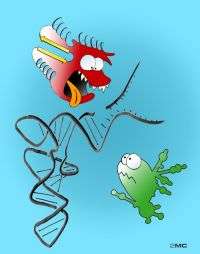A Molecular Identity Crisis - a 'Ribozyme Without RNA'

(PhysOrg.com) -- Not all enzymes that are assumed to require an RNA component in order to function do actually contain RNA. This surprising discovery was made during a project supported by the Austrian Science Fund FWF that focussed on the enzyme RNase P. Contrary to accepted scientific theory, the project team from Vienna has long believed that certain forms of RNase P do not contain any RNA. They have now succeeded in proving their point through a series of sophisticated experiments, the results of which are being published today in the journal Cell.
Although ribozymes are not quite living fossils, these enzymes - which function only in the presence of RNA - hail from a long gone age when biochemical processes were still controlled by RNA molecules. It was only later that proteins came onto the molecular scene. RNase P, an enzyme that modifies transfer RNAs, is one such RNA enzyme (ribozyme). All previously characterised forms of this enzyme confirmed assumptions about their RNA component. Nevertheless, evidence has also been uncovered over the past 20 years that has cast doubt on the universality of this finding and indicated that this enzyme could be made up solely of proteins. The experts certainly had plenty to debate.
But the debate seems to have been brought to an end. A group headed by Prof. Walter Rossmanith at the Medical University of Vienna has provided conclusive evidence by successfully identifying the components of human mitochondrial RNase P. Prof. Rossmanith: "RNase P is made up of three proteins that are solely responsible for the catalytic capacity of the enzyme without any RNA. This discovery has not been made before because the enzyme breaks down easily during purification due to the loose connection between its components. The approach we developed enabled us to get around this problem. That was the breakthrough that enabled us to identify the proteins." Johann Holzmann, a PhD student and member of Prof. Rossmanith's team, explains further: "The most difficult task was to track down the proteins. Everything started to move much faster once we had done that. We produced the individual proteins separately in bacteria, purified them and then used them to reconstitute mitochondrial RNase P in vitro. This finally removed any shadow of doubt for us - and CELL: mitochondrial RNase P does not contain RNA."
The identification of the three proteins also resolved another previously unanswered question in molecular evolution research: How is a ribozyme replaced by a protein enzyme? The answer provided by data collected during the project is that the protein-only mitochondrial RNase P developed in parallel to a pre-existing ribozyme. Eventually, it replaced the latter. It is interesting to note that the three protein components have been recruited from entirely different biochemical pathways and yet they have nevertheless retained their original functions. Prof. Rossmanith adds: "We are also calling mitochondrial RNase P a patchwork enzyme, because it seems to be assembled from components available by chance at the time of its appearance in evolution." It is still unclear why only animal mitochondrial RNase P and not all ribozymes have been replaced by protein enzymes. Indeed, the results of this successful FWF project have opened the door to a whole range of questions - and answers.
Original publication: "RNase P without RNA: Identification and functional reconstitution of the human mitochondrial tRNA processing enzyme" J. Holzmann, P. Frank, E. Löffler, K. Bennett, C. Gerner & W. Rossmanith. Cell 135, 462-474, October 31, 2008, DOI 10.1016/j.cell.2008.09.013
Provided by Austrian Science Fund
















